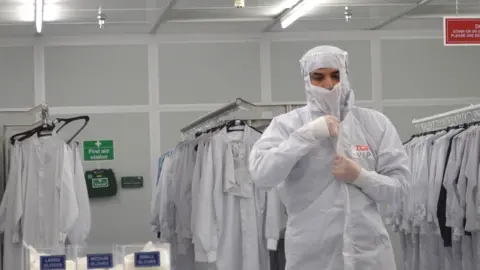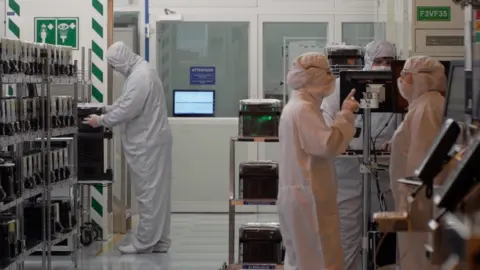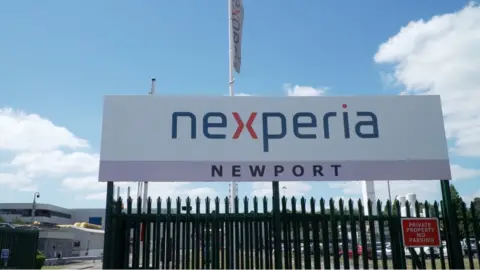China: Buyout of UK's largest microchip plant raises concerns
 BBC
BBCEntering Newport's fabrication plant is an other-worldly experience. Gloves, a white suit and hood need to be put on in the right order before stepping into a chamber where jets of air blast away remaining contaminants.
The process, a guide explains, is not to protect people, but the product. On the other side of the secure door, lies the UK's largest semi-conductor manufacturing facility, an environment one hundred times cleaner than a hospital operating theatre.
Inside ghostly white figures in suits move pods on trolleys. Robotic arms extract silicon wafers which are coated with photosensitive material. Then light is projected on to the wafer to print the pattern of the chips. What you end up with are semi-conductors - often known as microchips or just chips - on which much of our modern lives depend.
"Every silicon semiconductor product starts with a grain of sand," says Mary Curtis, a programme manager who has been working at the site for more than three decades, explaining that what comes out of the high-volume Newport plant ends up in cars around the world as well as white goods like washing machines.
Alarm bells
Newport has been operating since the 1980s but it has been thrust into the spotlight as an unlikely front-line in a new struggle between the West and China.
Last July, after it hit financial difficulties, Newport Wafer Fab was acquired by Nexperia, one of its customers. Nexperia is headquartered in the Netherlands but its ultimate owners are Chinese firm Wingtech Technology.
And that set off alarm bells.
"It's not in the strategic interest of the United Kingdom, the United States or any other allies that China gains prominence in the global semiconductor industry," says Martijn Rasser, a former CIA analyst and now a senior fellow at the Center for a New American Security think tank.

Semi-conductors are one crucial area in technology where China has struggled. Washington has taken advantage of this by restricting supplies to the Chinese telecoms company Huawei, causing it considerable pain. China is desperate to catch up and reduce its dependency.
That means the UK selling its largest facility to a company with Chinese ownership has met with resistance. Washington, especially Congress, will "lean heavily" to prevent the acquisition from being concluded says Mr Rasser.
But alarm bells did not initially seem to ring loud within the UK government. The National Security Adviser carried out a review whose conclusions remain unclear. It was only this May, close to a year after the sale and after heaving lobbying, that ministers ordered a national security review under new powers. This is due imminently (unless there is an extension) and could force the unwinding of the purchase.
The issues are thorny though.
Building resilience
The national security concerns are not about highly sensitive technology being made at the site with a defence or intelligence role. Rather it is about not having to rely on chips made overseas.
"We do need to build up our own domestic resilience as the US is doing, as the European Union is doing, as indeed many other countries around the world [are] trying to do," argues Tom Tugendhat, Chair of the Foreign Affairs Committee who has campaigned against the sale. "But in order to do it, we need to have the building blocks. Newport Wafer Fab is one of those building blocks."
The Newport facility does not make the most advanced semi-conductors. Taiwan is home to these and catching up is enormously costly - perhaps up to £10bn ($12bn) to build a state of the art fab and even this does not guarantee you can maintain a leading edge. Some question if the UK really has the will and resources to invest at this level.
But if it did, Newport is almost all it has to build on. It has also helped create a tech cluster in the local area.

Nexperia says being part of a global business is vital. "By investing in the UK, Nexperia has helped to secure the long-term health of the semiconductor industry here," it said in a submission to a parliamentary committee.
Within the plant, there is support for the takeover. The Chinese acquisition provided job security for the 500 employees and the promise of modernisation after a period of uncertainty. "The future wasn't looking very bright," one employee says.
The future of Newport goes to the heart of a bigger question - what is the government's over-arching China strategy? How far does it balance Chinese investment with security risks? A promised policy has yet to appear amid talk of splits between those focused on growth and those focused on security.
Inside the sterile fab, the final stage involves imprinted wafers being carefully examined for impurities. For years, the UK has been able to maintain a somewhat messy policy when it came to issues around Chinese investment. But now, under intense scrutiny, that looks to be getting harder.
